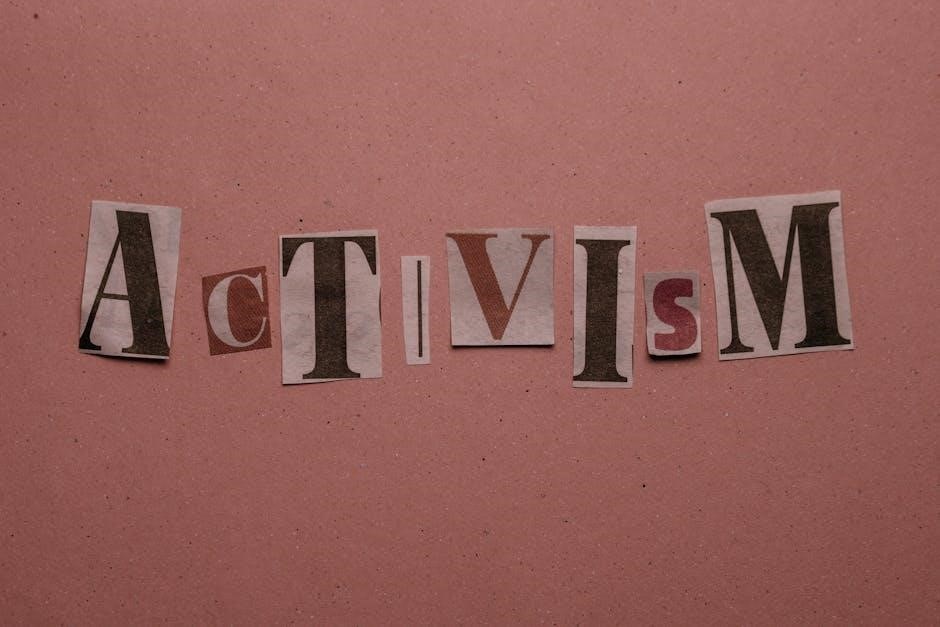justice with michael sandel pdf
Michael Sandel‚ a renowned Harvard professor‚ explores justice and ethics in his influential book Justice: What’s the Right Thing to Do?. His work bridges philosophy and real-world issues‚ making complex concepts accessible to all.
Michael Sandel’s Background and Influence
Michael Sandel‚ a prominent political philosopher and ethicist‚ has taught at Harvard University for over three decades. His groundbreaking course‚ Justice‚ is one of the most popular in Harvard’s history‚ attracting thousands of students. Sandel’s ability to engage audiences with ethical dilemmas has made him a global intellectual figure. His work challenges readers to think critically about justice‚ equality‚ and morality in modern society. Sandel’s influence extends beyond academia‚ as his ideas have shaped public discourse on issues like capitalism and individual rights. His accessible writing style and real-world examples have made complex philosophical concepts understandable to a broad audience.
Overview of “Justice: What’s the Right Thing to Do?”
Justice: What’s the Right Thing to Do? by Michael Sandel explores fundamental ethical dilemmas through real-world examples and philosophical theories. Based on his renowned Harvard course‚ the book examines justice‚ morality‚ and equality in contemporary society. Sandel challenges readers to think critically about complex issues‚ such as the limits of markets and the role of individual rights. By engaging with diverse perspectives‚ including utilitarianism and libertarianism‚ the book provides a comprehensive framework for understanding justice. Sandel’s accessible writing style makes these profound ideas relatable‚ appealing to both students and general readers. The book has become a cornerstone in modern ethical discourse‚ inspiring global conversations about justice and its application in everyday life.
Key Themes in “Justice: What’s the Right Thing to Do?”
Michael Sandel’s Justice: What’s the Right Thing to Do? explores themes of justice‚ morality‚ equality‚ and individual rights‚ delving into philosophical theories like utilitarianism and libertarianism.
Utilitarianism and the Greatest Happiness Principle
Michael Sandel examines utilitarianism in Justice: What’s the Right Thing to Do?‚ focusing on the Greatest Happiness Principle‚ which prioritizes actions that maximize overall happiness. He discusses how utilitarian thinkers like Jeremy Bentham and John Stuart Mill argue that moral decisions should aim to benefit the majority. Sandel highlights the tension between individual rights and collective well-being‚ questioning whether sacrificing one for the greater good is just. He also critiques the challenges of measuring happiness and the moral complexities of applying this principle in real-world scenarios‚ encouraging readers to think critically about its limitations and implications for justice.
Libertarianism and the Idea of Self-Ownership
Michael Sandel explores libertarianism in Justice: What’s the Right Thing to Do?‚ focusing on the concept of self-ownership‚ which asserts that individuals own themselves and their talents. Libertarians argue that this ownership grants absolute rights over personal property and labor‚ rejecting external interference. Sandel examines how this philosophy shapes views on freedom‚ equality‚ and justice‚ often leading to debates about taxation‚ redistribution‚ and individual responsibility.
Sandel critiques libertarian extremes‚ questioning whether individuals can truly “own” their abilities without acknowledging societal contributions. He highlights tensions between self-ownership and social equality‚ urging readers to consider the moral implications of radical individualism in a just society.

Michael Sandel’s Teaching Style and Popularity
Michael Sandel’s engaging teaching style and ability to connect complex ideas to real-world dilemmas have made his Harvard course on justice one of the most popular globally.
The Harvard Justice Course and Its Impact
Michael Sandel’s Justice course at Harvard is one of the university’s most popular offerings‚ attracting thousands of students. Known for its engaging and interactive format‚ the course challenges participants to explore complex ethical dilemmas through real-world examples. Sandel’s ability to make philosophy accessible has earned him widespread acclaim‚ with his lectures often resembling dynamic discussions rather than traditional classroom sessions. The course has also gained a global audience through online platforms‚ making it a landmark in modern education. Its impact extends beyond academia‚ inspiring public debates and fostering critical thinking about justice and morality in everyday life.
Engaging Students with Real-World Ethical Dilemmas
Michael Sandel’s teaching approach emphasizes active engagement with real-world ethical dilemmas‚ fostering critical thinking and moral reasoning. In his Justice course‚ he presents students with provocative scenarios‚ such as the trolley problem and debates over markets in human organs‚ to explore complex moral questions. This interactive method encourages students to question their assumptions and articulate their beliefs. By grounding philosophy in everyday issues‚ Sandel creates a dynamic learning environment where students grapple with the practical implications of ethical theories. His ability to connect abstract ideas to real-life challenges has made his lectures both intellectually stimulating and deeply memorable‚ inspiring students to think critically about justice in their own lives.

Real-World Applications of Sandel’s Ideas
Sandel’s concepts influence debates on fairness in healthcare‚ economic policy‚ and social justice‚ offering frameworks to address inequality and ethical decision-making in modern society effectively.
Justice in Modern Society: Legal and Moral Perspectives
Michael Sandel’s work explores the intersection of legal and moral justice in contemporary society. He examines how legal systems often grapple with ethical dilemmas‚ such as equality‚ rights‚ and punishment. Sandel argues that justice involves more than just following laws; it requires a moral framework that considers the well-being of individuals and communities. His ideas are particularly relevant in addressing issues like economic inequality‚ racial justice‚ and human rights. By bridging legal and moral perspectives‚ Sandel’s approach encourages a deeper understanding of what justice truly means in a globalized and diverse world. His insights have shaped public debates and policy discussions worldwide.

The Book’s Reception and Legacy
Justice: What’s the Right Thing to Do? has been widely acclaimed as a bestseller‚ sparking global discussions on ethics and morality. Sandel’s clear‚ engaging style has made it a landmark work in modern philosophy‚ influencing both academic and public discourse on justice.
Reviews and Critiques of “Justice: What’s the Right Thing to Do?”
Justice: What’s the Right Thing to Do? has received widespread critical acclaim for its accessible exploration of complex ethical theories. Reviewers praise Sandel’s ability to engage readers with real-world dilemmas‚ making philosophy relatable. The book has been described as a “landmark work” that bridges academic and public discourse. Scholars commend its clarity‚ while some critics argue it simplifies nuanced philosophical debates. Despite this‚ the book remains a defining text in contemporary discussions of justice‚ inspiring global conversations about morality and ethics. Its impact extends beyond academia‚ influencing public policy and cultural dialogue‚ solidifying Sandel’s reputation as a leading voice in political philosophy.

Michael Sandel’s Critique of Liberalism and Capitalism
Michael Sandel critiques liberalism and capitalism for prioritizing markets over moral values‚ arguing that they often undermine the common good. He contends that markets‚ when unchecked‚ corrupt valuable aspects of human life‚ such as education‚ healthcare‚ and family relationships. Sandel emphasizes that economic systems should serve moral and civic purposes‚ not the other way around. His critique challenges the notion that maximizing individual freedom and wealth leads to justice‚ highlighting instead the need for a more balanced approach that considers community‚ solidarity‚ and the moral dimensions of economic life. This perspective has sparked widespread debate about the ethical foundations of modern capitalism.

Justice‚ Dialogue‚ and Global Relevance
Michael Sandel’s work underscores the importance of dialogue in addressing global justice issues. He advocates for open discussions across cultures and societies to resolve ethical dilemmas. Sandel’s approach emphasizes listening to diverse perspectives‚ fostering mutual understanding‚ and bridging cultural divides. His ideas have resonated worldwide‚ making his Harvard course and book accessible to a global audience. By encouraging dialogue‚ Sandel aims to promote a more inclusive understanding of justice‚ applicable to various contexts. This global relevance highlights the necessity of ethical engagement in an interconnected world‚ ensuring that justice is not confined to local boundaries but embraces humanity’s shared challenges and aspirations.

Moral and Legal Dilemmas in Sandel’s Framework
Michael Sandel’s framework addresses moral and legal dilemmas by exploring the tension between individual rights and societal norms. He examines how legal systems often fail to resolve ethical conflicts‚ emphasizing the need for a deeper understanding of justice. Sandel uses real-world examples‚ such as murder under extreme circumstances‚ to illustrate the complexity of these issues. By challenging traditional legal and moral perspectives‚ Sandel encourages a more nuanced approach to decision-making. His work highlights the importance of ethical reasoning in navigating dilemmas‚ advocating for a balance between legal frameworks and moral responsibility. This approach fosters a critical understanding of justice in both personal and societal contexts‚ promoting a more equitable and compassionate society. Through his analysis‚ Sandel provides tools to address moral and legal challenges effectively.
Michael Sandel’s work revolutionizes the understanding of justice‚ offering accessible philosophical insights that profoundly impact contemporary ethical thought and global decision-making processes.
Reflecting on Sandel’s Contribution to the Discussion of Justice
Michael Sandel’s work has profoundly shaped contemporary discussions on justice‚ offering a fresh perspective that bridges philosophy and real-world dilemmas. His ability to engage diverse audiences through accessible language and relatable examples has made complex ethical theories understandable to everyone. Sandel’s critique of liberalism and capitalism highlights the limitations of market-driven societies‚ urging a reconsideration of moral values in public life. His emphasis on dialogue and global relevance underscores the importance of cross-cultural understanding in addressing justice. By challenging traditional frameworks‚ Sandel’s contributions have inspired new ways of thinking about fairness‚ equality‚ and morality‚ leaving a lasting impact on both academic and public discourse worldwide.
